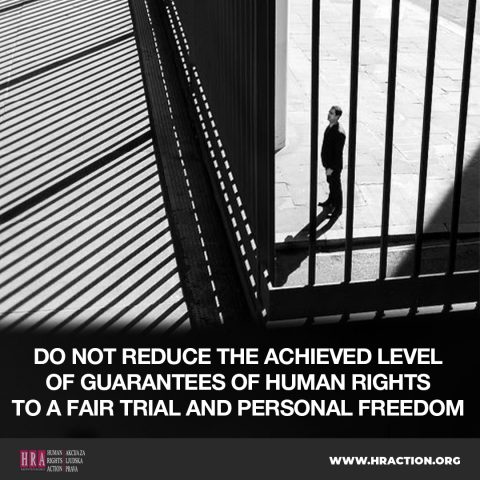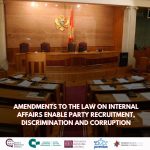
MERRY CHRISTMAS AND HAPPY 2024
31/12/2023
The Human Rights Action’s Position on the Termination of the Mandate of Montenegro’s Representative before the European Court of Human Rights: The Government Should Stop Passing Unconstitutional Decrees that Serve to Eliminate Undesirable Civil Servants (ad hominem)
23/01/2024DO NOT REDUCE THE ACHIEVED LEVEL OF GUARANTEES OF HUMAN RIGHTS TO A FAIR TRIAL AND PERSONAL FREEDOM – Reaction to the Ministry of Justice’s Proposal to Abolish Indictment Control and the Limitation of the Duration of Detention Preceding the First-Instance Verdict

As regards the announced amendments to the Criminal Procedure Code concerning the abolition of the institute of confirmation of indictment and the limitation of detention to three years before the issuance of the first-instance verdict, the Human Rights Action is expressing serious concern about the lowering of the achieved level of guarantees of human rights to a fair trial and personal freedom, which will occur if the above amendments are adopted.
Instead of encouraging the indefinite imprisonment of unconvicted persons, the authorities should address the reasons why the courts have been unable to reach first-instance verdicts for more than three years, and create conditions to speed up the trials.
We are inviting the Ministry of Justice to seriously reconsider the proposed amendments, bearing in mind the priority of protecting human rights.
The abolition of the institute of confirmation of indictment and limitation of the duration of detention encroaches on human rights and constitutes a move that requires a careful and thorough analysis, as well as a broad public debate.
The indictment control is a useful verification of the justification of the criminal trial, which, as a lengthy and costly process that may have serious consequences for the defendant, deserves a judicial verification prior to commencing. This phase of the criminal procedure also serves to eliminate unlawfully obtained evidence in a timely fashion, which is highly important for the fairness of the subsequent trial. The problems that have occasionally arisen in practice due to the superficial application of this institute had to do with adequate application, not the quality of the norm itself.
The limitation of the duration of detention before the first-instance verdict exists in some other European countries as well, serving as an additional guarantee of the right to personal freedom and the right to a trial within a reasonable time. A criminal trial must be efficient, and three years without a first-instance verdict is a long time. The Constitution, the law, and international standards require that the detention of the accused – who at that time is considered innocent – be reduced to a minimum and not be turned into a punishment. Abolition of the three-year term can lead to a delay in the trials to the detriment of the detainees, who will practically be serving terms to which they have not been sentenced. One also must not forget that the detention conditions in Spuž are much worse than those of facilities that hold convicted persons, and that they violate international human rights standards.
In contrast to Montenegro, where pre-trial detention can last no more than three years from the moment of the confirmation of the indictment regardless of the severity of the threatened sentence, in Bosnia and Herzegovina this maximum period applies only when long-term sentences are threatened, while in Slovenia and Croatia it is is even stricter, amounting to a maximum of two years.
We remind that, every year, the state pays considerable amounts in the name of compensation for the unjustified detention of people. Research conducted by the Centre for Civic Education showed that, from 2009 to 2017, Montenegro has paid more than EUR 11 million in compensation for unjustified deprivation of liberty.
In 2019, in the case Bigović v. Montenegro, the European Court of Human Rights found that the state had violated Article 5 of the Convention because the applicant spent more than five years in detention.






 English
English